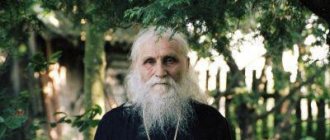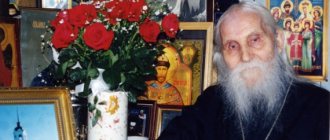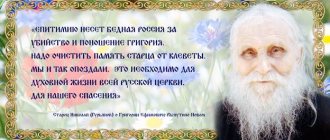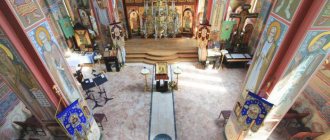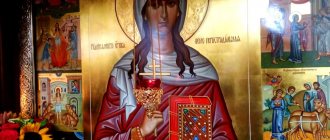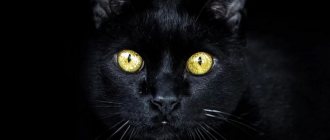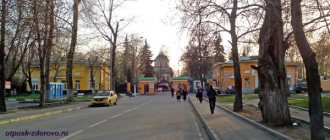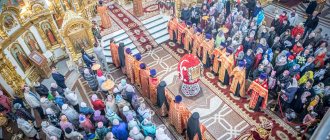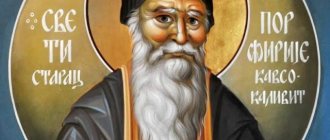The Monk Nektarios is the last Optina elder who took upon himself the feats of seclusion and foolishness. A visionary who long ago predicted the horrors of the repressions of Soviet power, from which he himself suffered and died in exile.
When the holy relics of the elder were found, his incorrupt body, amber in color, exuded a heavenly fragrance.
Portrait of St. Nektarios of Optina
Brief biographical information
1853 - born in the city of Yelets, Oryol province, into a working-class family.
At the age of 7, his father died, at the age of 11 the boy was orphaned and was forced to work, which is why he graduated from only a few classes of a rural parochial school. In 1873 he came to Optina Pustyn. Became the spiritual son of St. Anatoly (Zertsalov), and went to the Rev. for advice. Ambrose.
On March 14, 1887, he was tonsured into the mantle, on January 19, 1894, he was ordained a hierodeacon, and four years later he was ordained a hieromonk by the Kaluga bishop. In 1913, the brethren elected him an elder.
After the closure of the monastery on Palm Sunday 1923, the Monk Nektarios was arrested. After a short investigation, he was sentenced to death, but his spiritual daughter, poetess N.A. Pavlovich, went to Moscow to see N.K. Krupskaya, whom she knew from work, with a request to save her “grandfather,” an old monk who they wanted to shoot. As a result, on the personal instructions of the chairman of the GPU Beloborodov, the elder was released1. Upon leaving prison, the authorities demanded that Rev. Nektary left the Kaluga region, and in recent years he lived in the village of Kholmishchi, Bryansk region.
Died April 29/May 12, 1928.
In 1996, Nektary was canonized as a locally revered saint of the Optina Hermitage, and in August 2000, at the Jubilee Council of Bishops of the Russian Orthodox Church, he was glorified for church-wide veneration.
“NIKOLKA WILL WAKE UP - IT WILL BE USEFUL FOR EVERYONE!”
The last Optina elder, Venerable Nektarios, became such, in general, by accident. There were no prerequisites for this, other than God’s Providence. The origin of the future hieromonk was that of a worker and peasant, his education was elementary...
Nikolai Tikhonov was born in provincial Yelets in 1857 or 1858. The boy's parents loved him, but raised him in strictness. They were assigned to study at a rural school. His father, a mill worker, died when Kolya was seven years old. The mother outlived her husband by four years and managed to get her son into a merchant's shop. At the age of eleven, Kolya Tikhonov, a handsome, curly-haired, quiet boy, was left an orphan. Until the age of eighteen he worked as a junior clerk. I read a lot and spent all my free time in church.
Yelets . View of the city in the 19th century
The senior clerk had a beautiful daughter. The young people looked at each other. The girl’s father was already preparing the wedding, the merchant Khamov was not against it, he only advised her to receive a blessing from the hundred-year-old wise schema-nun Feoktista, the spiritual daughter of St. Tikhon of Zadonsk. Everyone in Yelets came to her for advice.
The old woman herself did not give the blessing - she sent Nicholas to Optina Pustyn, to Elder Hilarion, thereby determining his fate. The owner let the young man go reluctantly and did not give him a penny for the journey. So the eighteen-year-old groom came to the monastery with one Gospel. I didn’t know Hilarion or anyone else in the monastery. And a lot of people gathered in Optina at that time - crowds of people came to see Elder Ambrose, famous throughout Russia.
Nicholas was struck by the beauty of the monastery and its surroundings - flowers everywhere, green meadows, ship forests... Zhizdra meanders, glistening in the sun. Snow-white monastery walls with towers and weathervanes-angels...
View of Optina Pustyn in the 19th century
The monastic fathers he met sent him one to another. Finally, Elder Ambrose himself received the young man. High-ranking, noble pilgrims sometimes waited for weeks to be received by the saint, but for some reason the saint called the poor, uneducated orphan right away. We talked for two hours and... the young man did not return to his bride and remained in the monastery forever.
From the life of St. Nektarios
Before coming to Optina, Nektary was able to complete only a few classes of a rural parochial school. And while already in seclusion, with the blessing of the elders, he became acquainted with the works of the holy fathers: Abba Dorotheus, Saints John Climacus, Isaac the Syrian, Simeon the New Theologian, Macarius the Great, Saints Tikhon of Zadonsk and Demetrius of Rostov. And ten years later the elders blessed him to read secular authors and study secular sciences. I read many authors, Pushkin, Derzhavin could read by heart.
The elder said that God not only allows, but also requires that a person grow in knowledge. An example of this is Divine creativity, where there is no stop, everything moves, and angels do not remain in one rank, but ascend from level to level, receiving new revelations. A person must learn and move towards new and new knowledge.
Until the last year of his life, he was interested in modern literature, technical innovations (he studied them by carefully examining toy models of cars and steam locomotives), asked visitors about the “organization of education in schools,” and was interested in art. The lively mind and multifaceted interests of Elder Nektarios allowed him to quickly find a common language with the intelligentsia; many educated people of that time trusted him and listened to him.
Elder Nektarios said:
“You can do art like any other business..., but all this must be done as before the gaze of God... A book, a painting are tombs of light and sound. A reader or viewer comes, and if he is able to creatively look and read, then a “resurrection of meaning” occurs. And then the circle of art is completed. Light flashes before the soul of the viewer and reader, sound becomes accessible to his ears. Therefore, an artist or poet has nothing to be particularly proud of. He is only doing his part of the job. It is in vain that he imagines himself the creator of his works - one is the Creator... But there is also great Art - the word that kills and resurrects (the psalms of David, for example), but the path to this art lies through the personal feat of the artist, this is the path of sacrifice and one of many thousands reaches to the goal."
For a long time, Nectarius was in solitude. The following story has been preserved about his election to the elders in 1913:
When the brethren began to ask Father Agapit to point out a worthy candidate, he named Father Nektarios. The same one, in his humility, was not even present at the meeting. The brethren elected Father Nektary as an elder in absentia and sent Father Averky after him. He comes and says: “Father, you are asked to attend a meeting.” But Father Nektary refuses: “They will choose whoever they need without me.” “Father Archimandrite sent me for you and asks you to come,” insisted Father Averky. Then Father Nektary obediently put on his cassock and, as he was - one foot in a shoe, the other in a felt boot - went to the meeting. “Father, you have been chosen as the confessor of our monastery and an elder,” they greet him. “No, fathers and brothers! I am weak-minded and cannot bear such a burden,” Father Nektary objects. But the archimandrite tells him decisively: “Father Nectarius, accept obedience.” And then he obeyed.2
There are quite a few cases of clairvoyance and prophecies of the Monk Nektarios, as well as miraculous healings through his prayers. In particular, he played the fool a lot and predicted in personal conversations about the upcoming closure of Optina Pustyn, about searches and arrests. He also collected a spiritual library with the help of one novice, thereby predicting a spiritual famine for books.
FATHERS-MENTORS
Two great elders took the young man under their wing: the Monk Anatoly (Zertsalov) became his spiritual father, and Ambrose of Optina himself became his main adviser! It was they who formed from a poorly educated orphan a giant of spirit, to whom, many years later, the philosopher Konstantin Leontyev read his manuscripts and to whom the holy Patriarch Tikhon himself turned for advice.
And the young man’s “monastic career” began very modestly. The year was 1876. Nikolai Tikhonov’s first obedience was assigned to care for those very monastery flowers that he liked so much. Then Nikolai became a sexton. He tried very hard, didn’t get enough sleep, was late for church, scared the monks with his red, swollen eyes. They complained about him to Elder Ambrose. And he just smiled and said: “Wait, Nikolka will sleep it off, it will be useful to everyone.”
…Nikolai Tikhonov’s first obedience was to take care of those very monastery flowers that he liked so much. Photo las - initially
Experienced elders tested and humbled the young man “in his eyes.” “It used to be that I would come to Father Fr. Ambrose, and he said to me: “Why are you walking around doing nothing? I would sit in my cell and pray!” It will hurt me, but I don’t complain, but go to my spiritual father, Father Anatoly. And he greets me menacingly: “Why are you wandering around doing nothing? Have you come to celebrate?” So I’ll go to my cell. And there I have a large, full-length image of the Savior; It happened that I would fall before Him and cry all night: “Lord, what a great sinner I am, if even the elders do not accept me!”
In fact, the monks loved Nektarios very much, and he reciprocated their feelings. About Elder Anatoly, Nikolai recalled: “I treated him for twenty years and was the very last son and student, for which I still cry.” And about Elder Ambrose he wrote this: “...I turned (to him) only in rare and exceptional cases. Despite all this, I had great love and faith for him. It used to be that you would come to him, and after a few words of mine he would reveal the entire depth of my heart, resolve all my perplexities, pacify and console me. The elder’s care and love for me, unworthy, often amazed me, for I realized that I was unworthy of them.”
From the books of S.I. Fudelya
Sergei Iosifovich Fudel met with the Monk Nektary of Optina only once, in 1921, on his second visit to Optina Pustyn. This meeting was unusually brief and important for the life of S.I. Fudel - the Monk Nektary blessed Sergei Iosifovich to the priesthood, but Fudel did not undertake this feat, and, according to the elder, “experienced great suffering in life.” All his life, Fudel remembered this disobedience of his: “And now I want to ask everyone for forgiveness, bow to everyone. Anyone who, having received knowledge of both Light and Darkness, does not identify himself with the Light bears a grave guilt.”
This is how he describes this meeting in the book “At the Walls of the Church”:
When I was 20 years old, I entered the reception room of the Optina Elder Nektarios, in the monastery. There was no one in the waiting room except me. I didn’t wait long, surprised at the incredible silence of this place. The old man, whom I saw for the first time, came out to me with a quick gait, blessed me and immediately, without any preparation and without any appeals on my part, said: “Do you have a bride?” And, without waiting for an answer, he continued: “Go to His Holiness Patriarch Tikhon and ask him to consecrate you. The path of the priest opens before you.” I was silent, not expecting anything like this, stunned. “Do not be afraid,” he said, “and follow this path. God will help you in everything. And if you don’t go, you will experience great suffering in life.” He immediately stood up, blessed me and left. This was the first call for heroism, and I did not go to it.3
And another episode from that trip, a meeting with the holy fool Gavryusha, is described in “Memoirs”:
It was mid-May, and the flowers were already blooming in the monastery. I walked along the paths without meeting anyone, and this solitude struck me with its death-like silence. Then I heard angry muttering and saw Gavryusha - a holy fool, revered by the elders, with a long stick, in a shirt without a belt, with some kind of knapsacks on his shoulders. “Gavryusha,” I said, “what do I need? Should I go to a monastery or get married? And only then, for the first time in my life, did I see up close the menacing gaze of the blessed one. “What do I care? Either get married, or don’t get married,” there was obvious annoyance in the voice. He walked further along the path between the flowers, then suddenly turned around and added: “And you can’t carry the Gospel with other books in the same bag.”4
Near-death illnesses and prophecies of Nektarios. Blessed death
Since 1927, the elder’s strength began to noticeably fade. Diseases have worsened. In December, his condition worsened so much that everyone decided that the elder was dying. But unexpectedly relief came, and the monk lived for four months.
The last photo of Elder Nektarios
He ordered to bury himself not near the temple, but in the village cemetery. The monk foresaw that the temple would be destroyed, and that a dance floor and fair would be set up on the temple square.
After the revolution of 1917, Father left prophecies about the fate of Russia and Optina Pustyn. He said:
“Russia will rise up and will not be materially rich, but will be rich in spirit, and in Optina there will be seven more lamps, seven pillars.”
In April, Father Nektary’s health deteriorated. Father Adrian came to him, and the monk died in his arms. April 29, 1928 is the date of death of Saint Nektarios. The old man was buried in the local cemetery in the village of Kholmishchi.
Burial place of the Venerable Elder Nektarios
In 1935, the grave was dug up by robbers. They thought that the grave contained jewelry. In the morning, workers saw an open coffin leaning against a tree. In the coffin lay the incorruptible body of an old man with soft, waxy skin. While singing the prayer “Holy God,” the coffin was lowered into the ground again.
From memories of Elder Nektarios
According to the memoirs of Vasily Vasilyevich Shustin (1886 - 1968), who was with his young wife in Optina at the beginning of the twentieth century, “Father Nektary <...> was short, bent, with a small wedge-shaped beard, thin, with constantly crying eyes.”</…>
... the priest bowed to us from the waist and said: “Here is joy, here is joy... I was sad and sad, but now I am joyful (and his face shone with a childish smile). Well, how can I receive you now? “Sit down next to each other on the sofa,” and the priest sat down opposite. - After all, you were blessed by the great elder... <...> How great was the elder Barsanuphius! And amazingly, the priest was humble and obedient. Once, being a novice, he walked past my porch, and I jokingly told him: “You have exactly twenty years left to live!” I told him as a joke, but he obeyed, and exactly twenty years later on the same day, the fourth of April, he died. That’s how great of obedience he was.” Before such power, Fr. Nectaria involuntarily gave me a shudder. <…> “Now I have many visitors, and I cannot properly receive you. <…> Come at six o’clock in the evening, when the all-night vigil begins and all the monks go to church. I’ll also leave my cell attendant, and you come, let others pray, and we’ll spend time here.”
he sat us back together in the confessional room. “The young people came to me, and I, as the owner, must meet you according to your custom. Sit here for a while." Having said this, the elder left. After a while, he carries two glasses with dark liquid on a tray. He brought it to us, stopped and, bowing to us, said: “Congratulations on your marriage, I offer you a drink to your health.” We looked at the elder in bewilderment. Then they took glasses, clinked glasses and began to drink. But <...> it turned out that there was terrible bitterness in the glasses. I say “bitterly” to the priest, and my wife also turned away. And suddenly this very word I uttered, “bitter,” stunned me, and I imagined how they shout “bitter” at wedding dinners, and I laughed. And the priest read my thoughts and laughs. But, he says, although it is bitter, you must drink. Everything I do, you notice, it has a hidden meaning that you must comprehend, now drink. And we, with grimaces, pushing each other, drank this liquid. And the priest is already bringing an open box of sardines... <...> He comes again, sits down opposite us and says: “And I caught lightning. If you manage to catch her, if you want, I’ll show you.” He approaches the closet, takes out an electric flashlight, wrapped in red paper, and begins to light it briefly, flickering with fire. “Isn’t this lightning? Just like lightning!” <…> Then he came out again. We look, again he brings us two large glasses, this time with a light yellow liquid, and, with the same ceremony and bow, he brings it to us. We took the glasses, looked at them and for a long time did not dare to drink. The old man smiled, looking at us. We tried it. To our joy, it was a pleasant, sweet, aromatic drink... <...> For a snack, he presented us with minion chocolate, very fatty and a lot, and ordered us to eat it all. We were absolutely horrified. But he sat down next to us and started eating. I looked at the priest and thought: how can he eat chocolate, but according to the monastery’s rules, dairy is prohibited. And he looks at me, eats and offers it to me. So I remained perplexed. <...> Then the priest turned to me and said: “Now let’s go, I’ll teach you how to set up a samovar. The time will come when you won’t have a servant, and you will be in need, so you will have to install the samovar yourself.” <…> On one of my visits to Optina Pustyn I saw how Fr. Nectarius read the sealed letters. He came to me with the letters he had received, of which there were about 50, and, without opening them, began to sort them out. He put some letters aside with the words: “An answer must be given here, but these letters of gratitude can be left unanswered.” He didn't read them, but he saw their contents.5
V.V. Shustin, having been at the front of the First World War in the White Volunteer Army, was forced to emigrate to Bulgaria and then to Serbia, where he actively participated in church life. He accepted the priesthood and spent the last 30 years of his life in Algeria, where he was engaged in missionary work among the Berbers6. THEM. Kontsevich wrote about him: “The life of Father Vasily was a continuous feat, difficult and persistent, but he was very close to the shrine and was sanctified by it!”7.
In connection with the memories of V.V. Shustin cannot help but cite the note of Metropolitan Veniamin (Fedchenkov) about Father Nektarios8:
The revolution has begun. And this is the legend that reached me abroad. Father Nektary allegedly met those who came to arrest him with children's toys and an electric flashlight, completely calm. And in front of them he switched on and off the light of the lantern. Surprised by this behavior of the very old man, and perhaps also expecting some kind of reproof from the “saint” for their ugliness, the young people immediately switched from their usual anger to a complacently cheerful mood and said: “What are you doing?” A child, or what? “I am a child,” the old man answered mysteriously and calmly. <…> If you are not like children, you will not enter the Kingdom of Heaven.
DOLLIES FOR THE LORD
Outwardly, Father Nektary made a rather strange impression: in his youth, they say, he was handsome, but in his old age he had a wedge beard, his legs were swollen like logs from constantly standing in prayer, his ageless face was senile one second, youthful the next. lively and expressive. The elder’s behavior was even more incomprehensible - it surprised even those who had known him for a long time, and sometimes simply frightened those who were ignorant.
... Now the monk has laid out the dolls in front of him. I took one. He muttered something angrily, Feofan could barely make out the words: “Go to prison! On camera! That’s it!” Photo by VirtualWolf
The old man acted like a fool. He puts on a colored knitted jacket over his cassock - awkward, out of size - and walks around the monastery. Otherwise he will throw a robe over his naked body, a red bow on his chest and show off, embarrassing the brethren. During the meal he plays pranks: he pours sour, sweet, and salty things into one bowl, and eats and praises! I even got myself a gramophone and wanted to play records in the monastery, but the monastery authorities found out and didn’t allow it. He dragged all sorts of rubbish into the cell - pebbles, glass, clay, put it in a cabinet and began to brag to everyone: “Look what a museum I have!”
In the 1910s, Bishop Feofan of Kaluga came to Optina. The distinguished guest entered the cell of Elder Nektarios with outright distrust. Theophanes did not believe in the holiness of the new clairvoyant, about which the bishop was repeatedly reported. And he was not deceived in his assumptions: when he looked into the cell, Nectarius was there... playing with toys! He didn’t even raise his head to the Metropolitan, as if he didn’t exist. Nektarios's entire cell was filled with children's trinkets - airplanes, cars, trains, steamships... Now the monk has laid out the dolls in front of him. I took one. He muttered something angrily, Feofan could barely make out the words: “Go to prison! On camera! That’s it!” He took another: “I’ll punish you too!” Bad!” He started hitting the third one: “So you’ll know!”
One can imagine what the bishop was thinking about as he left the elder’s cell. What holiness there is! Senile infirmity, and nothing more. Apparently, Nektary has lost his mind...
Years have passed. After the revolution of the seventeenth year, the meaning of Nektarios’ strange actions began to be revealed to people. The monastery was turned into a museum (“Look what a museum I have!”). Students, female students and office workers, due to the poverty of the Civil War, began to go to work barefoot, wearing coats over torn underwear, but each had a red bow on their chest (exactly like the old man). And what happened to Bishop Theophan, who was so amazed at Nektarios’ dolls? He ended up in exile. He lived in the house of a cruel owner named Plokhin, and suffered greatly from his inhuman treatment. In 1937, Feofan was arrested. In the special corps of the Nizhny Novgorod prison, the bishop was brutally tortured - they beat him, put him in a basement cell, which was filled with water. It was then that Feofan remembered the Optina holy fool: “I am a sinner before God and before the elder: everything I said was about me, and I thought he was crazy...” In October 1937, Metropolitan Feofan was shot.
Yes, the words and actions of Father Nektary could indeed seem incomprehensible and provocative to people. But Father Nektary did not act arbitrarily - he received the blessing of the elders for his foolishness. Under his foolishness, the monk humbly hid his spiritual gifts - the ability to help people with advice to get out of specific and very difficult life situations and warn them about upcoming trials...
Literature:
- Blessed Optina: Memoirs of pilgrims about the monastery and its elders. M.: Father's House, 1998.
- Life of the Optina Elder Nektarios. Vvedenskaya Optina Pustyn, 1996.
- The complete life of St. Nektarios // Optina Pustyn. Official website of the Vvedensky stauropegial monastery. URL: https://www.optina.ru/starets/nektariy_life_full/ (Access date: 05/17/2017).
- Fudel S.I.
At the walls of the Church. - Fudel S.I.
Memories. - Boris (Kholchev), archimandrite.
Trip to Kholmischi. Memories of the Optina Elder Nektarios [URL].
DIDN'T SLEEP, DIDN'T LEAVE, DIDN'T LEAVE
Bishop Macarius, ordaining Nectarius as a hieromonk, gave him an instruction that the monk remembered for the rest of his life: “Nectarius! When you are sorrowful and despondent and when a grave temptation comes upon you, then repeat only one thing: “Lord, have mercy, save and have mercy on Your servant Hieromonk Nektarios.” Apparently, what was said was useful - the monk escaped from great temptations more than once.
... By coincidence, then a demand came to Optina: they needed a hieromonk for a trip around the world! Photo by Thomas Hawk
Possessing a magnificent voice and perfect pitch, in the first years of his life in the monastery, young Nikolai Tikhonov sang in the right choir. Once a year, the regent from the monastery came to the monastery, listened to the monks and selected the best for the choir of the Optina Hermitage. For the regent’s next visit, the brothers were learning “The Prudent Robber.” Nektary was very happy about this and was looking forward to the performance, but when he realized that after the selection he was likely to be removed from the monastery and transferred to a monastery, he began to deliberately fake it in front of the regent, misinterpreting “The Robber” so that the careless singer was hastily removed further to the left choir. There was no longer any talk about his translation.
Another time, already being a hieromonk in retreat, Nektary “plotted an escape.” During the years of seclusion, he read amazing stories about different countries and wonders of the world and knew as much as not every geographer and ethnographer knows. It is not surprising that at some point Nektarios had the idea to finally go on a journey and see the beauty of the world with his own eyes. By coincidence, then a demand came to Optina: a hieromonk was needed for a trip around the world! The acting archimandrite of the monastery turned first to Nektarios. The monk's joy knew no bounds! Almost ready to set off, Nektary went to Elder Joseph for a blessing, but he... did not bless. The hieromonk remembered the instructions of his teachers and humbly repeated to himself: “Lord, have mercy, save and have mercy on Your servant Hieromonk Nektarios!” - and remained in the monastery.
There was a third temptation. By that time, the Monk Nektarios was already nearly seventy and had already been elected an elder and spiritual father of all Optina. Anticipating the troubles that threatened the monastery, the brethren, and all of Russia, Nektary decided to abandon his obedience, quit his eldership and leave the monastery as a wanderer. “Only here did I realize that this was a temptation, I overcame myself and stayed.”
Notes:
- Shkarovsky, M.V.
Russian Orthodox Church in the 20th century. M.: Veche, Lepta, 2010. P. 100. - The complete life of St. Nektarios // Optina Pustyn. Official website of the Vvedensky stauropegial monastery. URL: https://www.optina.ru/starets/nektariy_life_full/ (Access date: 05/17/2017).
- Fudel S.I.
At the walls of the Church, p. 170 - 171. - Fudel S.I.
Memoirs, p. 84 - 85. - Vasily Shustin, priest.
Record about the Optina elders // Blessed Optina: Memoirs of pilgrims about the monastery and its elders. M.: Father's House, 1998. pp. 160-164. - This is the name given to the indigenous people of North Africa who speak a separate language. Starting from the 7th century, after the Muslim conquest, most Berbers became Sunni Muslims, and before that many of them were Christians: in particular, Bl. Augustine was probably of Berber descent.
- Strizhev A.N.
Notes // Blessed Optina: Memoirs of pilgrims about the monastery and its elders.
M., 1998. P. 294. Cf. Kontsevich I.M.
Optina Pustyn and its time. New York, 1970. P. 590. - Blessed Optina: Memoirs of pilgrims about the monastery and its elders. M.: Father's House, 1998. P. 278.
